
Topics
Chayes discusses her new book and the stories she couldn’t tell when she was at NPR. Chayes covered the US invasion of Afghanistan for NPR but she left journalism in 2002 to run an aid organization in Kandahar called Afghans for Civil Society. She now runs the Arghand cooperative. [includes rush transcript]
Over the weekend, two German journalists were killed on their way to conduct research for a documentary in the Tala Wa Barfak district of Baghlan province in Afghanistan. The Afghanistan Independent Journalists” Association estimates that there have been some 40 cases of violence against journalists over the past nine months.
And as the security situation continues to deteriorate, NATO’s top commander there has warned that the country is at a tipping point. General David Richards said that the Taliban could soon have the support of the majority of Afghans. He predicts that if life doesn”t get better over the next six months, 70 percent of Afghans could switch sides and support the Taliban. Richards comments come five years after the U.S. invaded the country with the stated intention of dismantling the Taliban. Suicide bombings are also up 600 percent this year while opium and poppy cultivation are at record highs.
- Sarah Chayes, former NPR correspondent who covered the US invasion of Afghanistan. She left journalism in 2002 to run an aid organization in Kandahar called Afghans for Civil Society. Sarah’s new book is “The Punishment of Virtue: Inside Afghanistan After the Taliban.” She now runs a cooperative called Arghand that sells hand crafted products in Afghanistan.
Transcript
AMY GOODMAN: Sarah Chayes joins us now. She’s a former NPR correspondent who covered the U.S. invasion of Afghanistan. She left journalism in 2002 to run an aid organization in Kandahar called Afghans for Civil Society. Sarah’s new book is called The Punishment of Virtue: Inside Afghanistan After the Taliban. Welcome to Democracy Now!
SARAH CHAYES: Thanks for having me.
AMY GOODMAN: What is the story we’re missing in Afghanistan?
SARAH CHAYES: Well, I think General Richards’s point is really accurate, I believe, but this is not a sudden thing that just happened this year. This is something that I’ve seen developing really since late 2002. And the problem has been that we didn’t really provide to Afghanistan what we said we would. We said that — we, the U.S. leading an international coalition — said that we were there to not only dismantle the Taliban, but begin to lay the foundations of a respectful democratic country that would carry Afghanistan forward into the community of nations, as it were.
But what happened was that our other motivations of the so-called war on terror ended up trumping those goals, so that instead of supporting thoughtful, educated leaders and helping bring them to power and helping develop that capacity for leadership, we basically recruited thugs, who were supposedly helping us in the war on terror and were meanwhile abusing, robbing their own citizens. And so, what you see now is just a terrible disaffection. It’s not an ideological opposition to the United States as a Western country. It’s just exasperation with the government that we ushered into power.
AMY GOODMAN: You, very early on in your book, talk about a report you couldn’t do or didn’t get in onto NPR. What was that story?
SARAH CHAYES: It was really this story. It was, I watched — there were U.S. Special Forces that were embedded in a group, a kind of tribal militia, which was directed to put pressure on Kandahar from the south. President Karzai also had U.S. Special Forces with him. He was coming down toward Kandahar from the north. The Taliban surrendered to him. They left. Al-Qaeda left the city. The city was in the hands of President Karzai and his chosen representative, and then these U.S. Special Forces urged this warlord to take the city by force from President Karzai.
AMY GOODMAN: Wait, now, explain how this went down and how you understood what was happening. You were on the border with this —?
SARAH CHAYES: I was on the border. I was not with this group, but I was on the border, and I was listening to the radio, where a lot of this played out, and I was speaking to people who were coming back across the border, and I knew that President Karzai had designated a certain person whose name is Mullah Naqib to be governor of Kandahar. And then, suddenly this warlord is in the city. And then, there’s this huge and angry standoff, which is being played out on the airwaves of the BBC actually, of their Pashto Service, and this warlord is saying, “No, I’m going to be governor of Kandahar.” And I knew there was something strange. And eventually that’s what happened. And Mullah Naqib basically pled old age and said, “Oh, I’m too old.” And I thought, “That’s not right.” You know.
AMY GOODMAN: The Karzai appointee for governor.
SARAH CHAYES: The Karzai appointee, that’s right, said, “Okay, this other guy is going to be governor. I’m too old to be governor.” And I knew that something had happened. And then I rode into the city maybe two days after this with somebody who had been with this warlord, so I asked him, “Well, how did it go? How did you guys happen to go and take Kandahar?” And He was a very young kid, you know, so he’s kind of all excited and enthusiastic. You know — Speed! Speed! — we went up the road, you know. And then I said, “Well, what about the Americans who were with you?” He said, “The Americans? They told us to do it.” I thought, “You have to be kidding me.”
And that, I thought, was a really emblematic story to tell that would help show us the direction this thing was going in, because it seemed to me — remember, this was before Iraq, Afghanistan was it — and I saw the eyes of the world riveted on how we were going to operate in Afghanistan, how Afghanistan was going to turn out, was going to be crucial to what happened in the next decade or the next half-century even, you know.
AMY GOODMAN: So, he’s saying the U.S. Special Forces had put this other warlord up against the U.S.-backed Hamid Karzai.
SARAH CHAYES: Right, exactly. So the United States was working at cross purposes with itself, number one. Number two, you’re already constraining the power of the person that you have designated to be president. You’re saying, “Okay, you can be president, but you can’t name — you don’t have the power to name your own governor.” And this dogged President Karzai for the first two years of his administration, when he was trying to limit the powers of some of these warlord governors that we had brought, we had allied with them.
AMY GOODMAN: The U.S. government had.
SARAH CHAYES: The U.S. government, that’s right, had allied with these guys, supposedly in the interest of the war on terror, and President Karzai was trying to limit their power and constrain them or even remove them, and he was told repeatedly that he couldn’t do that. And so, now he’s pretty much given up trying.
AMY GOODMAN: So why didn’t this story end up on Morning Edition or All Things Considered?
SARAH CHAYES: I was told that it wasn’t important now, that we would have plenty of time later to talk about inter-Afghan squabbling, and that what was really interesting now was to look at, you know, what a bad fellow Mullah Omar had been. And in my own view at that time, that story ought to have been done in 1996 or 1997. We already knew by this point how terrible the Taliban were. But now, I thought what was important was to look forward, at how is this experiment in nation building going to work. And it was kind of flattering our own, you know, sensibilities to continue telling ourselves how terrible the Taliban were.
AMY GOODMAN: To justify what was happening, and yet the U.S. was working on all sides at that point.
SARAH CHAYES: That’s right. That’s right. All sides. I’m not sure we were working with the Taliban, but we were clearly working hand-in-hand with the Pakistani government, which had created the Taliban movement. And that was another piece of massive self-contradiction in our policy.
AMY GOODMAN: Explain.
SARAH CHAYES: Well, the Pakistani government has used, has manipulated religious extremism for its regional agenda for 30 years. They’ve been doing it in Kashmir and doing it in Afghanistan. And when the Soviets occupied Afghanistan in the 1980s, we provided a lot of money to the Afghan resistance, but we couldn’t — we, the United States government — but we couldn’t do it directly, because of the Cold War implications of that. So the U.S. government — basically the CIA — gave a lot of money to the Pakistani military intelligence agency, which then distributed it how it wanted to. And it distributed most of the money to the most extremist faction of the Afghan resistance, in the hope that this faction would then take power in Afghanistan after the Soviets withdrew.
Well, guess what? Afghanistan turns out not to be a very ideological country. It’s really counterintuitive, but that’s what I have experienced in the five years that I’ve lived there, and they were having none of this guy, this very extremist faction leader. The rest of Afghanistan was not interested in him taking power. Pakistan, the Pakistani government continued to provide him with money. And so, there was four years of civil war, while the other factions were fighting him off, and he, with a lot of support from Pakistan, was still trying to take over.
After four years of civil war, the Pakistani government realized that this guy was not going to make it, and so they began creating the Taliban movement, creating this movement out of whole cloth. It didn’t rise up inside Afghanistan. It was created across the border in Pakistan and inserted into Afghanistan into the Kandahar region.
But again, it wasn’t a kind of global jihadi thing. The language was global jihadi language, but the objectives, the agenda was a regional agenda that has everything to do with Pakistan’s relationship with India, frankly. So, to me, it was a little bit — how to put it? — illogical that the United States government would suddenly think that Pakistan on the drop of a hat would abandon a 30-year-old policy and suddenly join the anti-terror coalition in a real way. So what I have seen is that Pakistan has very cleverly — the Pakistani government — has very cleverly kept the United States happy by turning over an al-Qaeda operative every once in a while, but has always protected the Taliban. There’s a distinction between these two groups, because their agendas are different, even though their language may be very similar. So if we work hand-in-hand with Pakistan, we’re actually working with a government that is bent on undermining Afghanistan.
AMY GOODMAN: And, though it’s not your subject, Pakistan providing nuclear material to North Korea.
SARAH CHAYES: Of course, of course. To North Korea and to Iran, I believe, also. I mean, A.Q. Khan, the guy who’s considered to be the father of the bomb in Pakistan, it’s manifest that he has been involved. I mean, the whole nuclear trail leads back to him, and there is no way he is a rogue actor acting on his own. Pakistan doesn’t function that way. The Pakistani government is a very closed system in the hands of the military, basically, I would say, military and military intelligence establishment. So I keep hearing about the military intelligence establishment being rogue, you know, and so there are these rogue elements in the Pakistani military that are supporting the Taliban. And then we hear the same thing, “Oh, A.Q. Khan was a rogue element. No, President Musharraf is a product of that establishment.
AMY GOODMAN: General Musharraf.
SARAH CHAYES: That’s right.
AMY GOODMAN: Your response to the Senate Majority Leader Bill Frist saying that Afghanistan has to accept that Taliban should be in the government.
SARAH CHAYES: I find that an extremely ignorant statement, because that implies that the Taliban are a homegrown movement that is genuinely competing for power inside Afghanistan. They are not. Anybody who is any Talib or former member of the Taliban regime who is genuinely interested in participating in the Afghan government, there are plenty of them right there right now. There are plenty of former Taliban currently in the Afghan government. The people who are fighting right now are ginned up by a hostile neighbor, which is Pakistan. So that would be — you know, it’s completely illogical.
AMY GOODMAN: And the hunt for Osama bin Laden being shut down, and soldiers who were in Afghanistan being moved to Iraq, once Iraq started happening once the U.S. invaded Iraq?
SARAH CHAYES: Well, this was a really interesting experience for us on the ground, because we had been hearing about this Marshall Plan that was supposed to happen for Afghanistan. And throughout 2002, we were wondering, where is this Marshall Plan? You know, what are they waiting for? Where is all of this focus and interest and energy that’s supposed to be devoted to Afghanistan? And it wasn’t until a number of books started coming out about Iraq, starting really last year, that I realized there was never any focus on Afghanistan, you know? The resources, the focus, the money were already being held in reserve for Iraq from the day the Taliban fell in Afghanistan. So, indeed soldiers were pulled off, but I would say that the full effort was never devoted to Afghanistan.
Now, the hunt for Osama bin Laden, I think that that’s a red herring in a lot of ways. I actually don’t think that Osama — this is a personal opinion based on some evidence, but a lot of deduction also — I don’t think the guy was ever in Pakistan after 9/11 or on the Afghan/Pakistani border. I think, you know, you’re going to rob a bank, are you going to hang around on the street corner for the cops to arrive?
AMY GOODMAN: You’re saying he’s not in Pakistan?
SARAH CHAYES: Correct. Neither Pakistan nor eastern Afghanistan. I suspect that he left Afghanistan very early on, perhaps even before 9/11. And so, the whole — all of this focus on the eastern mountains — there may be other al-Qaeda operatives who were there — but I don’t believe that Osama bin Laden is there, and I don’t believe that Pakistan is protecting him, because I have seen Pakistan be very forthcoming with al-Qaeda operatives. What they’re not forthcoming with is the Taliban leadership, which is not sitting around in caves or in Waziristan or in secret places. It’s sitting around in Quetta and Balochistan, the capital of a province.
AMY GOODMAN: Before we end, Sarah Chayes, you left journalism, and now you’re with an aid organization. Tell us what you’re doing now? We have less than a minute.
SARAH CHAYES: Right. It’s not an aid organization. I left that aid organization. I’m now running a cooperative called Arghand — that’s A-R-G-H-A-N-D — and we make high-quality skin-care products, which you can buy in the United States and Canada using licit local agriculture.
AMY GOODMAN: Why are you doing this?
SARAH CHAYES: It’s way of trying to combat opium-growing. In other words, the best way to make it possible for people not to plant poppy is for them to be able to make money growing other things.
AMY GOODMAN: And your choice to do this?
SARAH CHAYES: It’s about grassroots. It’s about building democracy on whatever level you can in a cooperative, where there are good relations with producers, where there’s a collective decision-making process, and where we can honor a lot of the traditional licit crops that Kandahar has been known for for millennia. Sems like a worthwhile thing to be involved in.
AMY GOODMAN: Sarah Chayes, former NPR correspondent, left NPR in 2002, is now working with a soap collective in Kandahar, and we will link to that website on democracynow.org. Thanks for joining us.
SARAH CHAYES: Thanks for having me.

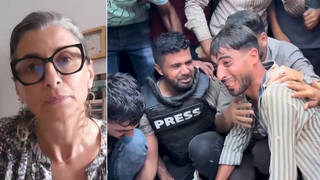
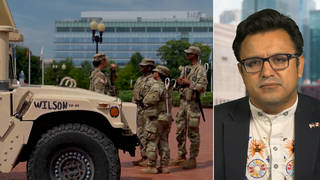
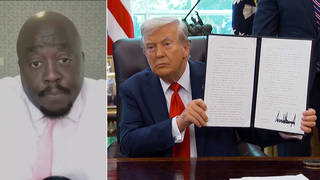
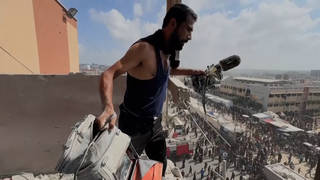





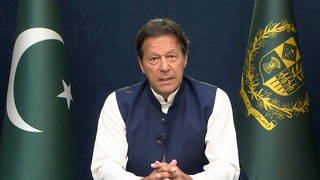
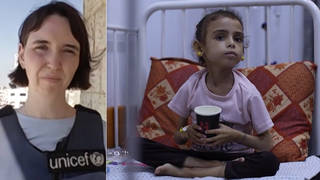
Media Options